

Europe's Copyright Rules Will Stifle Free Expression. On May 25, 2018, those who follow internet policy in Europe had one overriding area of interest: the General Data Protection Regulation (GDPR), a game-changing set of privacy rules that served as the perfect cover for another, far more drastic and controversial change in European law.

The Copyright in the Digital Single Market Directive had been under negotiation for years, and it was set to be the first update to E.U. copyright since the 2001 Copyright Directive. In the 17 intervening years, the copyright landscape had experienced massive shifts. Today Parenting for a Digital Future releases the third in a series of reports from our nationally representative survey of UK parents of children aged 0-17.
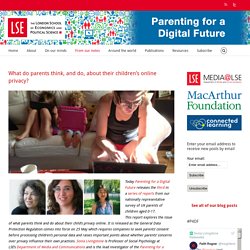
This report explores the issue of what parents think and do about their child’s privacy online. It is released as the General Data Protection Regulation comes into force on 25 May which requires companies to seek parents’ consent before processing children’s personal data and raises important points about whether parents’ concerns over privacy influence their own practices. The-truth-about-how-we-use-facebook-20180326-p4z6dg. Data after death: NSW Government to review digital asset laws. Posted At some stage in most people's lives they will consider what will happen to their personal property after their death.
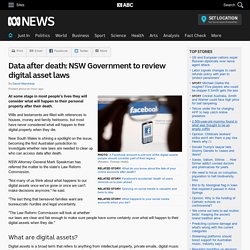
Wills and testaments are filled with references to houses, money and family heirlooms, but most have never considered what will happen to their digital property when they die. New South Wales is shining a spotlight on the issue, becoming the first Australian jurisdiction to investigate whether new laws are needed to clear up who can access data after death. NSW Attorney-General Mark Speakman has referred the matter to the state's Law Reform Commission. The Real Truth About These Persistent Digital Citizenship Myths. Why it’s time to prioritise digital literacy – World Wide Web Foundation. When we think of literacy, we usually think of the ability to read the words in a book, or to write something down.

Despite our increasingly digital world, it is less common for us to think about digital literacy — the skills and capabilities needed to participate fully, effectively and equally in our digital world. International Literacy Day is being celebrated today (8 September) under the theme of ‘literacy in a digital world’. This theme recognises the vital nature of not just the ability to read and write, but also the ability to use digital technologies. The Schoenblog: When Social Media Breaks Bad: Why I STILL Want My Students Using Social Media. Monday, February 6, 20176:40 PM “Fear is the path to the dark side.

Fear leads to anger. 5 Steps To A Connected Classroom – Kim Cofino – Medium. One of my absolute favorite things to talk about is the power of global collaboration – both for teachers and for students.
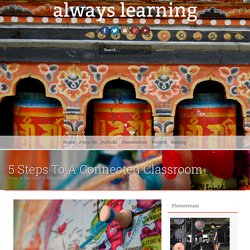
It’s amazing what you can learn when you start connecting yourself (and your class) to others around the world. So I’m really looking forward to hosting my next Eduro Learning Facebook Live session this Friday on this very topic! Social Media Privacy Terms Translated into Plain English, Finally. We fully expect our kids and our students to adhere to social media privacy terms with due diligence.
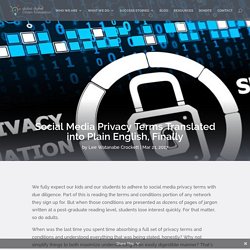
Part of this is reading the terms and conditions portion of any network they sign up for. But when those conditions are presented as dozens of pages of jargon written at a post-graduate reading level, students lose interest quickly. For that matter, so do adults. When was the last time you spent time absorbing a full set of privacy terms and conditions and understood everything that was being stated, honestly? Eight ways to think about digital employability – WeAreOpenCoop. How to Keep Messages Secure. Heading to a protest, organizing with activists, or suddenly concerned about the politics of your parents?
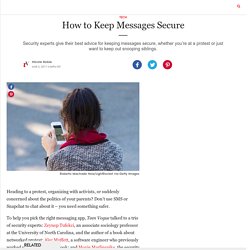
Don’t use SMS or Snapchat to chat about it – you need something safer. To help you pick the right messaging app, Teen Vogue talked to a trio of security experts: Zeynep Tufekci, an associate sociology professor at the University of North Carolina, and the author of a book about networked protest; Alec Muffett, a software engineer who previously worked on security at Facebook; and Moxie Marlinspike, the security researcher who founded Open Whisper Systems, which developed the encryption used by WhatsApp and other messaging tools.
To secure your messaging, they advise three steps. First, update your apps and Android or iOS to the latest version. Second, set a long PIN of at least eight characters to unlock your handset. Getting Sneaky About Digital Citizenship – DigCit Institute. Article reposted with permission from nancywtech.com Dear Teachers, I met with a librarian friend of mine today to brainstorm ways to get digital citizenship embedded in lots of different areas of her school.
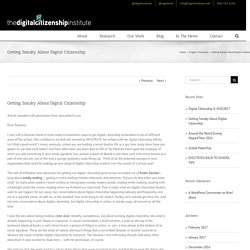
Tracking...so what? 7 things we know you're going to say. 1.
I've got nothing to hide Whether you have something to hide or not is totally irrelevant. Privacy is not about hiding - it is about autonomy, power and control; it is about your ability to decide how you present yourself to the world. Given how much data about you is constantly being collected, mostly in ways that you can't see, this erosion of your privacy can't help but have an impact in the long run - on your job or on future jobs; on your networks; on how much you end up paying for specific products; and on a range of other things. 2.
Not all digital traces are important and no, maybe what you eat for breakfast doesn't matter. But when you look carefully at the digital traces you create, you'll find a mix: some might be very banal (your breakfast), but others might be much more personal - where you go (which can also show what you're doing, and with whom), or what your health concerns are. 3. Looking for a job or applying for credit? Still think it's 'just the internet? ' 4. 5. 6. SAGE Journals: Your gateway to world-class journal research. Facebook’s accidental ‘deaths’ remind us to plan for digital demise – Medium. By Tama Leaver, Curtin University The accidental “death” of Facebook founder Mark Zuckerberg and millions of other Facebook users is a timely reminder of what happens to our online content once we do pass away.
Earlier this month, Zuckerberg’s Facebook profile displayed a banner which read: “We hope the people who love Mark will find comfort in the things others share to remember and celebrate his life.” Similar banners populated profiles across the social network. After a few hours of users finding family members, friends and themselves unexpectedly declared dead, Facebook realised its widespread error. It resurrected those affected, and shelved the offending posthumous pronouncements. For many of the 1.8 billion users of the popular social media platform, it was a powerful reminder that Facebook is an increasingly vast digital graveyard. A Teacher’s Lesson On Internet Safety Turns Into A Photoshop Battle. Slideshow Culture November 7, 2016 at 12:25 The teacher’s original post. via Imgur The Mark McGrath treatment.
It’s like a mirror looking into a mirror… The Constitution treatment. Creepy. The hostage treatment. The Snowden treatment. via Imgur. The Chairman Mao treatment. In the era of social media, it’s important to be careful about what you post online. The teacher’s post was initially a success, but it eventually fell into the hands of Reddit user Prawnjoe who submitted it for an epic Photoshop battle. Digital Literacy Tips: Strategies for Online Fact Checking. Has someone you know shared an article link via email, Facebook, or another social media website that seems too outlandish to be true? Before liking, favoriting, or re-sharing the article link, did you take a few moments to fact-check it by searching online for other sources which either corroborate or refute the article’s claims? If so, congratulations! Your actions in fact-checking links suggest you have some good digital literacy skills. In this post we’ll highlight several useful, online fact-checking strategies and discuss a recent article which can be used with students to highlight this important digital literacy skill.
Digital Presence vs Digital Citzenship – Age of Awareness – Medium. “Let’s not let students leave school in isolation, with only Friday on their minds. Let’s ensure they are well connected, independent, and empowered to learn anywhere, anytime.” – Paul Moss “Connected, independent and empowered” learners should be the aspiration for all students and every educator.
As schools strive to provide students with greater agency over their learning, online connections become increasingly important. Students following their passions must connect with others who share that passion as well as experts in the field. The Kids Are All Right: The Dangers of Digital Parenting – Education Reform – Medium. “Today’s … teenagers are the most sensitive, least violent, least bullying, least racist, least homophobic, most globally-minded, most compassionate, most environmentally-conscious, least dogmatic, and overall kindest group of young people … ever known.” — Elizabeth Gilbert Young people these days are wiser than they are frequently given credit for. According to the age-old generational view, however, our young people are out of control and technology is largely to blame. The reality is that schools today deal with issues pertaining to social choices and interactions that can sometimes be misinterpreted as “technology problems”.
The popular view — propagated by some scaremongering media sources — is that inappropriate technology use is rampant among today’s youth. The evidence, however, confirms a very different reality. Do not track. Like. Flirt. Ghost: A Journey Into the Social Media Lives of Teens. How to raise a screen-ager in this digital age. 30+ Digital Citizenship Resources for Every Teacher. Theage.com. This Generation Will Be Fine: Why Social Media Won’t Ruin Us. Do You Ever Grow Out Of Digital Parenting? - CLRN. Data ethics. Why we need ‘view source’ for digital literacy frameworks. Learning with 'e's: Digital literacies in the age of remix.
Tech coaching for digital citizenship.
Digital safety, privacy, copyright & legal. Digital literacy and fluency. Digital habits of learning. Digital etiquette and respect. DC Curriculum. Digital Divide. Always on. This is what it's like to grow up in the age of likes, lols and longing. Adapt. Fast. — Modern Learning. 10 steps technology directors can take to stay relevant SmartBlogs. Stop Saying Technology is Causing Social Isolation — Digital Culturist. Rise and Shine! How to Boost Your Teacher Brand and Digital Reputation.
10 Social Media Skills for Every Modern Teacher [Infographic] The Real Me. Participate Learning: #whatisschool 1 April 2016. The Power of Audience. The Remix Society – Betchablog. Byte Sized Potential. The Greatest Risk for Content Curators — Content Curation Official Guide. We Are Conflicted: It IS About the Technology — The Synapse. Steve Wheeler: Digital Learning Futures: Mind the Gap! 7 Sins. Teens, Social Media & Technology Overview 2015. Parents and Social Media.
Tips for Choosing a Classroom Blog. How Can Tech Give Students “Ah-ha!” Moments? — Bright. How Can We Bring Teachers Along for the Ride? The Web We Need to Give Students — Bright. Sean Junkins sur Twitter : "Kids and Technology. #digcit... WiFi Swap. How to prepare for your digital afterlife - CNET. The Schoenblog: Why I Want My Students Using Social Media: Reason #1 - Community. The Schoenblog: Why I Want My Students Using Social Media: Reason #2 - Crowdsourcing & Connecting. The Schoenblog: Why I Want My Students Using Social Media - Reason #3: Sharing Our Awesome. 21 Amazingly Interesting YouTube Facts in 2016. Web 2.0: cool tools for school. ETL523 Digital Citizenship in Schools. Why Blogging (Still) Matters.